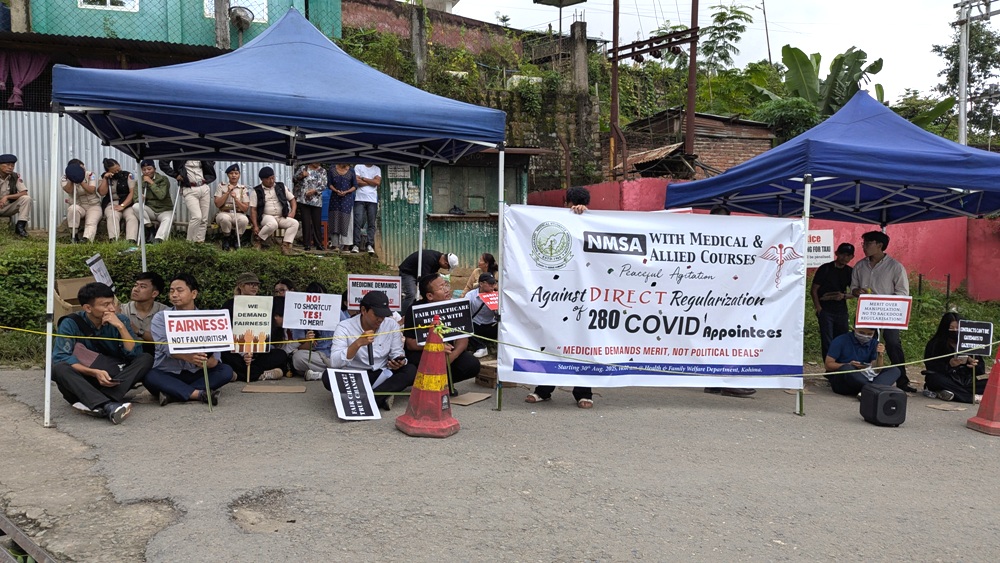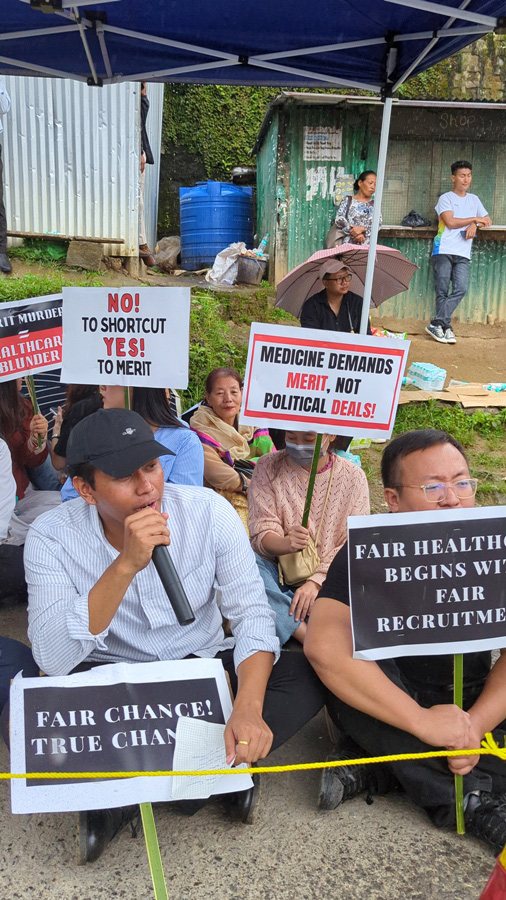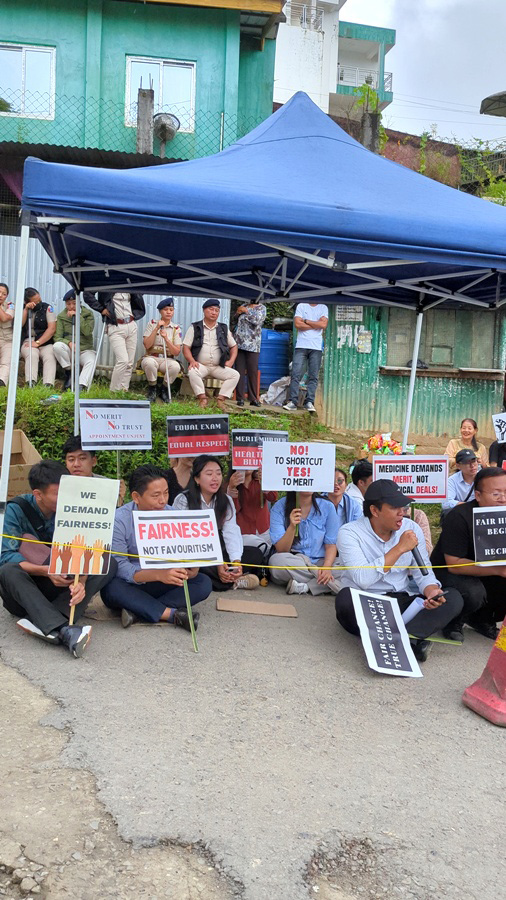Nagaland Medical Students’ Association protests against the regularisation of 280 Covid-era health posts, demanding fair recruitment.
Share

KOHIMA — The Nagaland Medical Students’ Association (NMSA) staged a protest outside the Directorate of Health and Family Welfare on Saturday, demanding the revocation of the state government’s decision to regularise 280 health worker positions that were appointed during the Covid-19 pandemic.
The protest, led by medical students and supported by their parents, highlighted concerns over what they described as an unjustified and irregular process of regularising the posts.
On August 18, the department of Health and Welfare had issued a notification announcing the regularisation of 98 medical officers, junior specialists, and other health workers who were appointed on a contractual basis during the Covid-19 pandemic.
Also read: Bitter pill: Covid hires spark job row in Nagaland
The notification followed a Cabinet memorandum from May 2022, which had proposed the creation of 390 posts for doctors, nurses, and paramedics, with a preference for those who had worked in Covid-19 facilities for at least 100 days.

While the government framed the regularisation process as a positive step, providing permanent employment to health workers who had contributed during the pandemic, the NMSA and other protesting medical students have raised concerns about the fairness and legality of the process.
The students, particularly those from the 2016 batch, argue that the positions should be filled through a formal recruitment process conducted by the Nagaland Public Service Commission (NPSC), rather than through a departmental screening process (DSP), which they believe undermines the merit-based selection system.
NMSA president Dr. Pito S Rochill, who is currently an MBBS intern, maintained that the issue at hand is not about the delayed salary payments or the temporary nature of these posts but about the manner in which the regularisation process is being carried out.
According to him, the process bypasses the legal and regulatory framework established by the Nagaland Health Service Rules of 2006, which stipulate that all Class-I gazetted officer positions, including medical officers, must be filled through NPSC exams.
“Our primary demand is that the government revoke the decision to regularise these posts and instead conduct a fair and transparent recruitment process through the NPSC,” he said during the protest.
Read more: High Court dismisses petitions challenging regularisation of Covid-era doctors in Nagaland
The NMSA also criticised the government for failing to engage in meaningful dialogue with the stakeholders, particularly the Konyak Union’s Longchang unit, which represents the areas directly affected by the regularisation.
According to the protesting students, no representative from the union was invited to the meeting that led to the decision on regularisation, and their concerns were ignored despite multiple representations.
Parents of the protesting students also voiced their concerns during the demonstration, expressing solidarity with their children’s demands. One mother, whose three children are studying in the medical field, argued that the decision to regularise the positions without going through the NPSC process was unjust and set a dangerous precedent.
She questioned how Class-I gazetted officer positions could be regularised through a departmental screening committee, bypassing the established recruitment procedures.

“The NPSC is the proper channel for recruitment to these posts, and we cannot allow the government to bypass this system,” the mother stated. “My children, and many other students, have worked hard for years to earn their medical degrees. They deserve a fair chance to compete for these positions based on merit, not through political decisions.”
Another parent also criticised the regularisation process, asserting that the recruitment of medical officers and other healthcare workers should be conducted through the same system that the state uses for all other posts, such as NPSC, NSSB, and respective departments.
“There is no reason why these 280 posts should be treated differently,” he said. “We appreciate the services of the Covid-era appointees, but the government must follow the due process and provide equal opportunities for everyone.”
The protesting medical students warned that if the government continues with this irregular process, it could set a dangerous precedent for future recruitments. “If this happens, it will become increasingly difficult for aspiring candidates to trust the recruitment system,” one NMSA member stated.
“The government should not be allowed to make exceptions, particularly for such critical positions as medical officers.”
While acknowledging the contributions of the Covid-era appointees, the medical students said that their protest was not against the individuals but against the system that they believe is being misused.
The regularisation process reportedly began on August 27 in the directorate, with further proceedings scheduled for the following days. However, as of Saturday, the department of Health and Family Welfare has yet to issue an official statement.